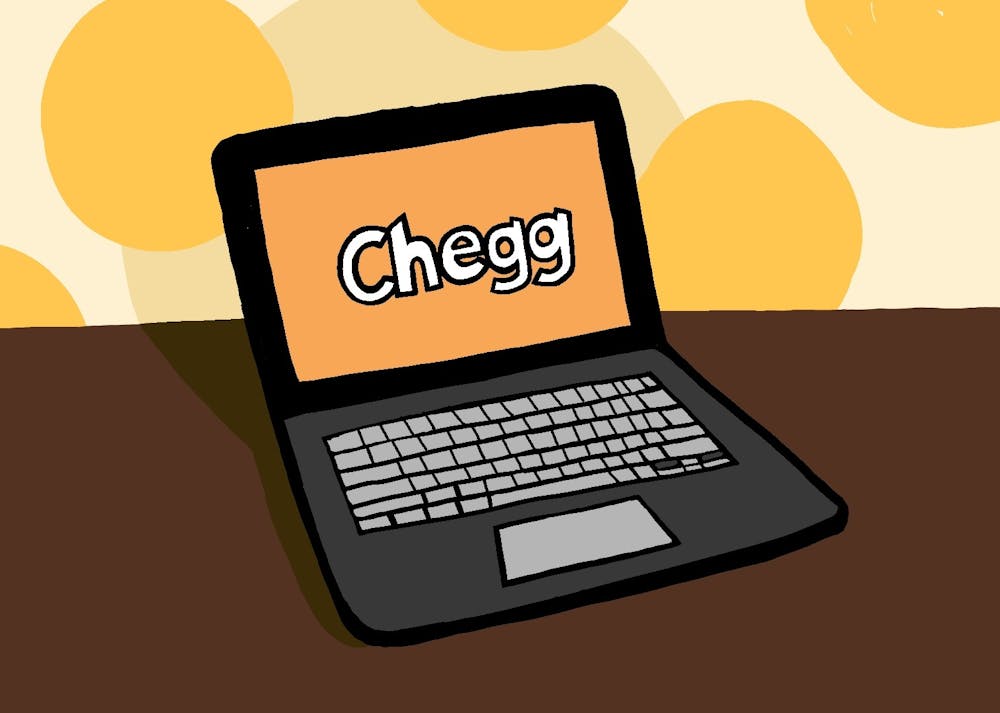Chegg, a textbook rental and tutoring website that reported over 5.3 million subscribers in August, has stopped providing student information to colleges and professors in an effort to protect student privacy.
On Aug. 8, Chegg updated its honor code policy to only provide colleges with dates and time stamps of when questions are posted or answered by students.
The website, similar to Course Hero and Bartleby, has gained notoriety for providing answers to worksheets, tests and quizzes, and formerly shared user data with colleges such as revealing their usernames, emails and IP addresses.
The trend of protecting students' privacy online was also demonstrated in a recent federal district court ruling in Ohio that deemed room scans, a method used to monitor students through online proctoring during tests, a violation of the Fourth Amendment.
READ MORE: Ruling against room scans may prompt changes in online monitored testing at ASU
While Chegg has options for learning by using flashcards or step-by-step guides, it is common for students to use the website to search for their textbooks and find the answers to their exams or assignments.
"If you discover your materials at Chegg.com you can use the following steps to request the items be taken down using the Digital Millennium Copyright Act," reads the Ira A. Fulton Schools of Engineering's Academic Integrity Faculty FAQ website.
If a student is suspected to be cheating, Chuck Barbee, the Academic Integrity Officer for Fulton, is a liaison between Chegg and Fulton professors.
"We can access the answers to any solution on Chegg if we suspect that it's been used, so it's very easy to compare the Chegg solution to the student's solution," Barbee said. "We can get timestamps about when things were posted or when things were solved, and relating back to examination times. So while Chegg has retracted some of what they provide, they still provide a lot of information for universities."
If students are found guilty of cheating in Fulton, they are at minimum required to take a two-hour class about academic integrity, Barbee said. Sanctions can vary from receiving a zero on an assignment, failing a class and getting an XE grade on your transcript, a suspension or even expulsion.
"Instructors are taking a lot of strategic measures to use Chegg themselves to (determine) whether a student's assignment or exam problem was posted on Chegg by that student," Barbee said.
Javier Gonzalez-Sanchez, a lecturer for the School of Computing and Augmented Intelligence, has found that the best way to combat cheating is to subtly change questions on exams. Every semester, Gonzalez-Sanchez will change his assignments to stay ahead of cheating.
However, Gonzalez-Sanchez remains more concerned about how to remove his class materials from the internet and looks to get those sources taken down instead of focusing on catching the students using them. Sanchez acknowledged that often students, especially those in computer classes, have ways of avoiding being detected.
“Most of the students share information and do not use the real kind of information," Gonzalez-Sanchez said. "They do not use the real name, login, password, and even the IP addresses. Most of the students are familiar with VPN — their IP is not going to be in their home or even in Arizona."
Tejaswi Linge Gowda, a clinical assistant professor at the School of Arts, Media and Engineering, has been able to identify students who cheat without utilizing Chegg due to the nature of his coding classes.
"(Coding) is very individual, even the way you will name your variables," Gowda said. "If (their code has) such a match, it's almost impossible two people came up with the same code."
Chegg is not the only way students can and will continue to get information on their class assignments, students have begun to utilize private Discord servers to make a network within the class to cheat without detection, Gonzalez-Sanchez said.
Gonzalez-Sanchez said he doesn't see the change in Chegg's honor code policy having an impact on students who cheat.
"My perception is that the students in the computer science program have several different ways to share information and Chegg is one of them, but it's not the only one," Gonzalez-Sanchez said.
Edited by Jasmine Kabiri, David Rodish and Greta Forslund.
Reach the reporter at caera@asu.edu and follow @CaeraLearmonth on Twitter.
Like The State Press on Facebook and follow @statepress on Twitter.

Caera Learmonth is a full-time reporter for the Community and Culture desk. She was previously the Executive Editor of her high school newspaper and has taken journalism programs at the School of the New York Times and University of Southern California.




